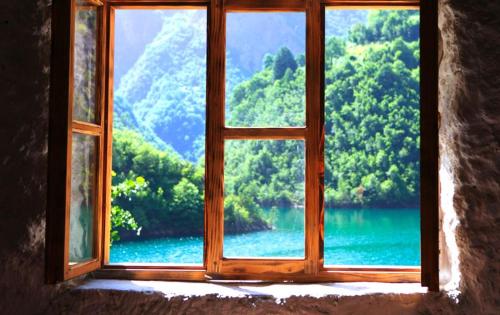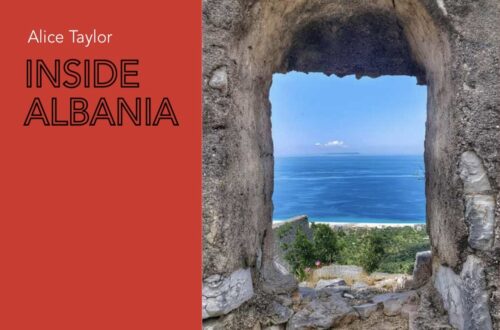Northern Albania faces a demographic crisis as thousands of youth leave yearly for bigger cities or Europe. But it is not just tourism and community at risk- it is a long and unique history of tradition, anthropology and feudal social systems that could soon disappear completely.
The Kanun of Dukagjini is a centuries-old code used to manage all sectors of society. Divided into 12 sections, It tackles how water from local rivers is divided among farmers, family roles, dispute resolution, punishment of crimes, land division, honour, and most importantly- the revered status of guests.
While many consider the Kanun outdated and its rules controversial by today’s standards, the requirement to put guests above anyone, including family, remains.
Marjana Koceku from Dukagjin is desperate to preserve her roots.
“What I find amazing, as a young girl that studied abroad also that graduated in political science and international relations and as a girl that travelled quite a bit in Europe, is the importance of hospitality and the guests in your home….When it comes to food, when it comes to drinks when it comes to honouring the person that comes into your house and the port. Our dwelling still belongs to ‘God, and the guest’ is still present, is still strong, and it is the strongest part of people’s life in these areas.”
Many of Marjana’s generation have left, but despite her Italian education, she has decided to stay, opening a small guesthouse on the edge of a lake and promoting her way of life and local artisan crafts online.
“Northern Albania is definitely Europe’s hidden gem, with glorious mountains, mesmerizing fjords, amazingly beautiful lakes, a very rare, unique old gastronomy and very kind people, beautiful traditions, and a lot to tell about generations about its anthropology, social side, and customs in general.”
But this is under threat due to what Marjana calls a need for more infrastructure and little investment from local and national governments.
“Youth in these areas especially do not see a hope for their future when they lack basic needs like medical care and educational needs…”
“But what’s the worst is that beautiful houses and lands are being abandoned. And in this way, it’s a big threat to the cultural inheritance to nature, to the culture in general, to the population itself…”
However, she hopes that sustainable and slow tourism, focussing on the unique culture of the highlands, could offer a solution.
“Tourism is becoming the main source of living for people in this region…..More young people are inspired not to leave for other countries but to invest their energies and their future here, and this is great because lands are reviving.”
Through her initiative Neomalsore (new Highlander), she wants to encourage Albanian youth to get back to their roots and understand their traditions and customs, while stimulating tourism.
“My motto, the future is in our roots…The new Highlander actually is a wide concept that wants to raise awareness and how important it is for us to go back to nature. To connect with our roots, and to live by sustainable means.”
She wants to inspire others to follow her lead and offer tourists a unique insight into how Albanian highlanders lived. Open-air kitchen with wooden fires, fresh, seasonal produce, and properties built into the side of the mountains, best accessible by boat and where internet is out of the question.
“One of my main focuses is the old, most excellent gastronomy. I am working every day to use very old peasant recipes and foods that people used to live from and used to enjoy for centuries. And foods that are really simple, made of three-four ingredients maximum. Both are very organic or very delicious, but furthermore, above all, they have a great history.”
Matilda Naco from the Albania Tourism Association also voiced concerns over a lack of staff for the sector.
“Tackling the problem holistically would be the only long-term solution. This means we have to adopt systemic approaches, otherwise building strong relationships with the government bodies and sustainable institutions for education,” she said, adding the first alarm about the lack of staff to support the tourism sector was first sounded 12 years ago.
Meanwhile, the Albanian Tourism Minister, Mirela Kumbaro, said that focusing on tourism in the north is a strategic priority.
“Our aim is to have tourists who stay longer, who spend more and who diversify their tourist itinerary also through nature tourism in the protected areas that currently make up more than 21% of the surface of Albania, and culinary and gastronomic tourism that is seeing a significant increase thanks to the supporting initiatives of the Albanian government.”
But for Majrana, preserving roots is number one. “We have such treasures, such gaps that need to be preserved and inherited… people have here a very great love for their roots, for their houses and for their culture and what is theirs.”
Follow The Balkanista!


